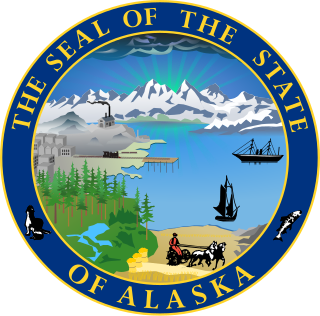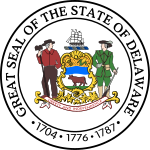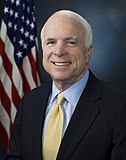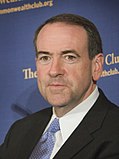
This article contains lists of official candidates associated with the 2008 Republican Party presidential primaries for the 2008 United States presidential election.
The following is a timeline of major events leading up to and immediately following the United States presidential election of 2008. The election was the 56th quadrennial United States presidential election. It was held on November 4, 2008, but its significant events and background date back to about 2002. The Democratic Party nominee, Senator Barack Obama of Illinois, defeated the Republican Party's nominee, Senator John McCain of Arizona.

The 2008 Iowa Republican presidential caucuses took place on January 3, 2008. The Iowa Republican caucuses are an unofficial primary, with the delegates to the state convention selected proportionally via a straw poll. The Iowa caucuses mark the traditional formal start of the delegate selection process for the 2008 United States presidential election.

From January 3 to June 3, 2008, voters of the Republican Party chose their nominee for president in the 2008 United States presidential election. Senator John McCain of Arizona was selected as the nominee through a series of primary elections and caucuses culminating in the 2008 Republican National Convention held from Monday, September 1, through Thursday, September 4, 2008, in Saint Paul, Minnesota. President George W. Bush was ineligible to be elected to a third term due to the term limits established by the 22nd Amendment.

The Mitt Romney presidential campaign of 2008 began on January 3, 2007, two days before Mitt Romney left office as governor of Massachusetts, when he filed to form an exploratory committee with the Federal Election Commission to run for President of the United States as a Republican in the 2008 election. Subsequently, on February 13, 2007, he formally announced his candidacy for the Republican nomination for president in 2008. He did so at the Henry Ford Museum and Greenfield Village in Dearborn, Michigan, as an emblem of American ingenuity.
Statewide public opinion polls conducted relating to the 2008 Republican Party presidential primaries, typically using standard statistical methodology, include:
The first political debate before the 2008 Republican primaries was held on May 3, 2007, at the Ronald Reagan Presidential Library in California. Other debates have taken place in New Hampshire, South Carolina, and Florida. They were generally broadcast by television networks.

The Mike Huckabee 2008 presidential campaign began on January 28, 2007, when former Governor of Arkansas Mike Huckabee announced his candidacy for the Republican nomination for President of the United States for the 2008 election. Huckabee ultimately ended his bid for the nomination after losing the Texas Republican primary on March 4, 2008.

The 2008 United States presidential election in Iowa took place on November 4, 2008, as part of the 2008 United States presidential election. Voters chose seven representatives, or electors to the Electoral College, who voted for president and vice president.

The South Carolina presidential primary is an open primary election which has become one of several key early-state presidential primaries in the process of the Democratic and Republican Parties choosing their respective general election nominees for President of the United States. South Carolina has cemented its place as the "First in the South" primary for both parties.

The 2008 Michigan Republican presidential primary took place on January 15, 2008. Mitt Romney came in first with 39 percent of the vote, followed by John McCain with 30 percent and Mike Huckabee in third-place with 16 percent. The victory was widely viewed as critical for the Romney campaign, as a loss in Michigan, where his father was governor, would have resulted in a loss of momentum after two losses already in New Hampshire and Iowa.

The 2008 Nevada Republican presidential caucuses was held on January 19, the same day as the 2008 South Carolina Republican primary, with 31 delegates at stake. Mitt Romney was the winner in Nevada with 51% of the votes, with Ron Paul in second place. Half of Romney's votes came from Mormons, while two-thirds of the independent voters favored Paul. According to the Las Vegas Sun, Republicans crossed over in large numbers to vote Democratic; CNN exit polls indicated that Republican voters made up 4% of the Democratic caucus turnout.

The 2008 Oklahoma Republican presidential primary was held on February 5, with 41 delegates at stake. It was a closed primary, meaning only registered Republicans could vote in the election. The primary was on Super Tuesday on the same day as twenty-three other states. John McCain won Oklahoma's primary with 37% of the vote, although Mike Huckabee picked up some delegate votes as well by receiving 33% of the vote.

The 2008 Alaska Republican presidential caucuses were held on February 5, 2008, and has a total of 26 delegates at stake. Mitt Romney won the state, and, as the winner in Alaska's congressional district, was awarded all of that district's delegates. All results are from the presidential preference poll held at the caucuses. Actual delegates were selected on February 5 or 9 at district conventions held throughout the state, and finally at a statewide convention held between March 13–15 in Anchorage.

The 2008 Montana Republican presidential caucuses took place on February 5, 2008, with 25 national delegates. The first caucuses were scheduled for midday in Sheridan County and Judith Basin County.

The 2008 Tennessee Republican presidential primary took place on February 5, 2008, with 52 national delegates. Mike Huckabee narrowly defeated John McCain to win the largest share of Tennessee's delegates to the 2008 Republican National Convention. Both McCain and the third-place candidate Mitt Romney received delegates along with Huckabee.

The 2008 West Virginia Republican presidential caucuses took place on February 5, 2008, to select 18 delegates to the 2008 Republican National Convention. An additional nine delegates were selected in a primary election on May 13, 2008, for a total of 27 delegates to the national convention. Mike Huckabee won the caucuses, and John McCain later won the primary.

The 2008 Washington Republican presidential caucuses were held on Saturday February 9 and the primary on February 19, 2008 to compete 40 total delegates, of which 18 tied to the caucuses, 19 tied to the primary, and 3 unpledged RNC member delegates.
The following is a timeline of major events leading up to the United States presidential election of 2012. The election was the 57th quadrennial United States presidential election and was held on November 6, 2012.

The 2008 United States presidential election in Delaware took place on November 4, 2008, and was part of the 2008 United States presidential election. Voters chose three representatives, or electors to the Electoral College, who voted for president and vice president.



















